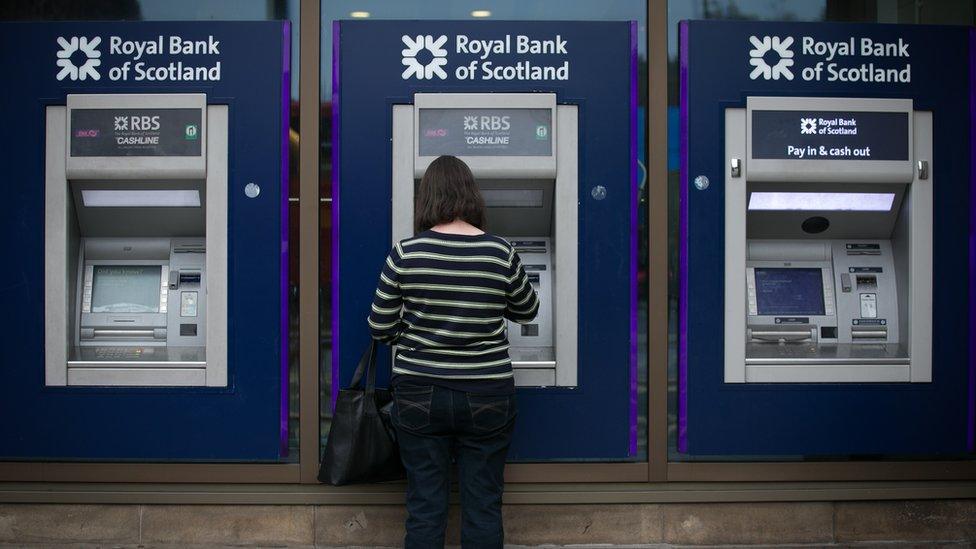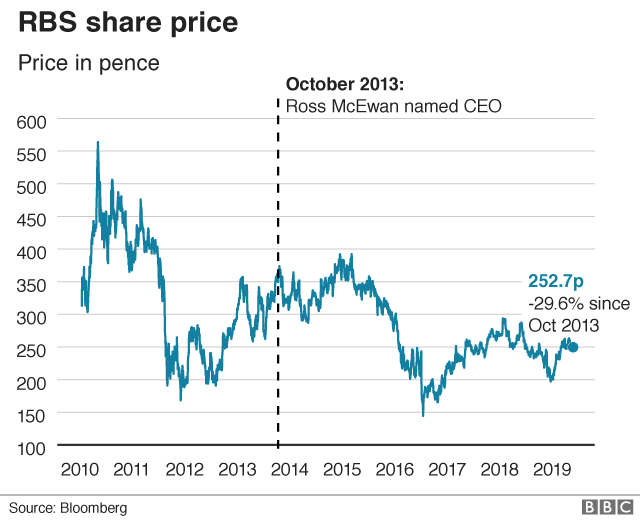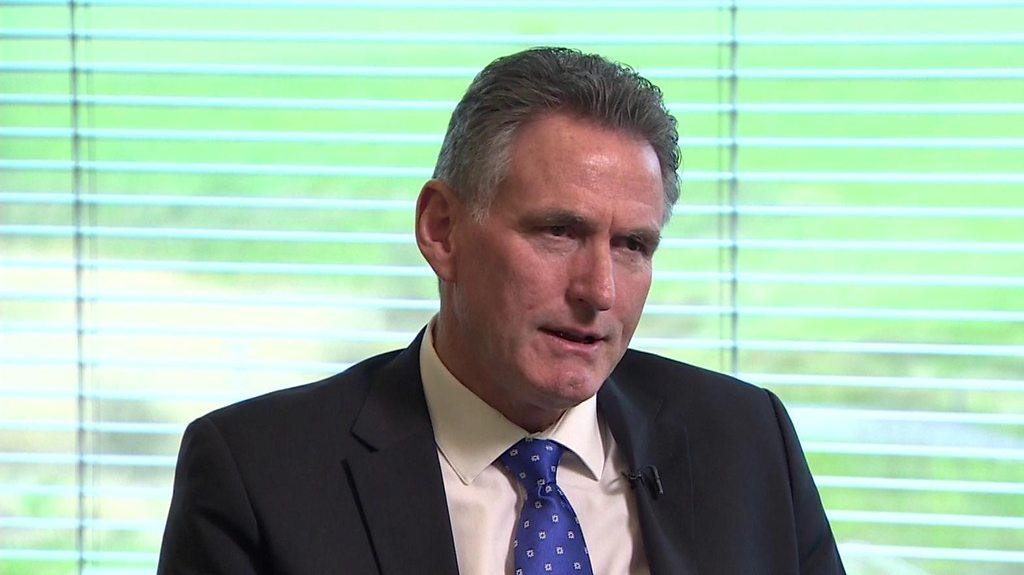RBS chief executive Ross McEwan resigns
- Published
Ross McEwan says not enough time was spent on customers
The chief executive of RBS, Ross McEwan, has resigned after five and a half years in the post.
Mr McEwan, aged 61, said that he had "delivered the strategy" that he set out when taking over in 2013.
Under his leadership the bank, which is 62% government-owned, has closed hundreds of branches, but last year reported a profit of £1.62bn, more than double the profit of the previous year.
He will remain in the role until a successor has been appointed.
"It is never easy to leave somewhere like RBS. However with much of the restructuring done and the bank on a strong and profitable footing, I have delivered the strategy that I set out in 2013 and now feels like the right time for me to step aside and for a new chief executive to lead the bank," Mr McEwan said in statement.
When Mr McEwan took over in 2013, RBS was loss-making and had businesses in 30 countries.
His strategy was to reduce the size of the bank by withdrawing from overseas markets. Last year, the bank had operations in 12 countries.

He also cut costs at the UK banking business, which includes NatWest, by closing branches.
In 2014, the bank employed 109,000 staff, but by the end of last year that was down to 67,100.
After nine years of losses, RBS returned to profit in 2017 and started paying dividends again last year.
Shares have fallen 29% since Mr McEwan took over 1 October 2013.


Customer service woes
The bank has struggled to improve customer service.
In February the Competition and Markets Authority published the results of its latest survey of customer satisfaction. More than 16,000 people were canvassed.
RBS came last out of 16 banks when respondents were asked whether they would recommend their personal current account provider to friends and family. Natwest came 10th.
Small businesses were also surveyed and in this category RBS was second-last out of 14 banks, while NatWest came eighth.
Speaking to the BBC, Mr McEwan said customers should have received more attention: "It would have been nicer to have spent a lot more time focusing on the customers of this bank.
"But we found ourselves in some many conduct and litigation-type issues, that we had to get through, and consumed a huge amount of my time."

Analysis:
Douglas Fraser, business editor, BBC Scotland
When he stepped up to the top job after running the retail part of RBS, Ross McEwan had instructions from the majority shareholder, the Government, to focus closer to home and to shrink its international reach.
So it is now a largely British and Irish bank, making it all the more exposed to the potential Brexit fall-out for its business customers.
At the same time, the amiable New Zealander had what he called several "noisy" years sorting out multi-billion pound regulatory fines and pay-outs in court cases.
There has been the controversy over mistreatment of business clients in financial distress, and political pushback against branch closures.
Trying to meet European Commission requirements to shrink the bank by splitting off the Williams & Glyn division has been a time-consuming, expensive failure.
And the share price has stuck stubbornly at around half the break-even point for the UK Government's bail-out.
Ross McEwan would have preferred to have returned RBS to market disciplines rather than government ones, but the share price has hindered that sale.
Through the turmoil of returning to a sustainable profitability, he has tried to keep things simple, using his retail expertise to focus RBS on its customers. That has meant navigating an unprecedented churn in technology, with a rapid shift to apps and online banking.
With the finances back in the black, McEwan has acknowledged that turning round the reputational problems for Royal Bank of Scotland is a 10 year project for his successor to see through.
With a recent restructure of executive roles, it looks like Alison Rose, currently deputy chief executive of Natwest, has been groomed for the role, though Katie Murray may think differently, having been recently promoted to RBS chief financial officer.

GRG controversy
Mr McEwan has attracted criticised for his handling of the controversy surrounding RBS's Global Restructuring Group.
The Global Restructuring Group (GRG) was marketed as an expert service that could save a business, but according to a report by the Financial Conduct Authority one in six firms transferred to the service were actually damaged by it.
Most of the issues occurred before Mr McEwan took over as chief executive.
However, Mr McEwan had to admit that he was wrong when he told MPs in 2018 that the GRG unit helped "the vast majority of businesses it works with".
US settlements
Last summer RBS agreed to settle a long-running investigation by US authorities into the mis-selling of financial products in the run up to the financial crisis of 2008.
RBS agreed to pay $4.9bn (£3.6bn) - making it one of the last major banks to settle cases related to the US mortgage market.
The deal paved the way for the government to reduce its holding in RBS from more than 70% to 62%.
The bank has been majority-owned by the government since it received a £45bn bailout at the height of the financial crisis in November 2008.
- Published25 April 2019
